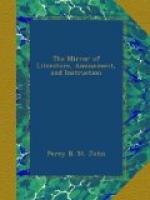At length the sun began to descend behind the western mountains; upon which the Kadhy, having shut his book, received a last greeting of “Lebeyk;” and the crowds rushed down the mountain, in order to quit Arafat. It is thought meritorious to accelerate the pace on this occasion; and many persons make it a complete race, called by the Arabs, Ad’ dafa min Arafat. In former times, when the strength of the Syrian and Egyptian caravans happened to be nearly balanced, bloody affrays took place here almost every year between them, each party endeavouring to outrun and to carry its mahmal in advance of the other. The same happened when the mahmals approached the platform at the commencement of the sermon; and two hundred lives have on some occasions been lost in supporting what was thought the honour of the respective caravans. At present the power of Mohammed Aly preponderates, and the Syrian hadjys display great humility. The united caravans and the whole mass of pilgrims now moved forward over the plain; every tent had been previously packed up, to be ready for the occasion. The pilgrims pressed through the Aalameyn, which they must repass on their return; and night came on before they reached the defile called El Mazoumeyn. Innumerable torches were now lighted, twenty-four being carried before each pasha; and the sparks of fire from them flew far over the plain. There were continual discharges of artillery; the soldiers fired their muskets; the martial bands of both the pashas played; sky-rockets were thrown as well by the pashas’ officers, as by many private pilgrims; while the Hadj passed at a quick pace in the greatest disorder, amidst a deafening clamour, through the pass of Mazoumeyn, leading towards Mezdelfe, where all alighted, after a two hours’ march. No order was observed here in encamping; and every one lay down on the spot that first presented itself, no tents being pitched except those of the pashas and their suites; before which was an illumination of lamps in the form of high arches, which continued to blaze the whole night, while the firing of the artillery was kept up without intermission.
[5] At the close of the sixteenth
century, according to Kotobeddyn,
the
whole plain of Arafat was cultivated.
[6] The Mahmal (an exact representation
of which is given by D’Ohsson)
is
a high, hollow, wooden frame, in the form of a cone,
with a
pyramidal
top, covered with a fine silk brocade adorned with
ostrich
feathers, and having a small book of prayers and charms
placed
in the midst of it, wrapped up in a piece of silk.
(My
description
is taken from the Egyptian Mahmal.) When on the road,
it
serves as a holy banner to the caravan; and on the
return of
the
Egyptian caravan, the book of prayers is exposed in
the mosque
El
Hassaneyn, at Cairo, where men and women of the lower
classes




